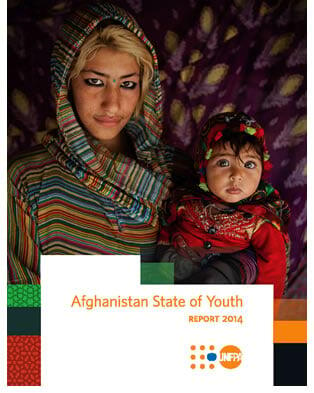Kabul, 9th December 2014 - More than 60 percent of the population in Afghanistan is below the age of 25. Their rights and needs should be placed at the centre of the country's development agenda so they will have the opportunities to develop, prosper and fully contribute to society. This was one of the recommendations shared today at the presentation of the Afghanistan State of Youth Report 2014 and The State of World Population 2014 launched by UNFPA, the United Nations Population Fund.
Developing countries with large youth populations could see their economies soar, provided they invest heavily in young people's education and health and protect their rights, according to The State of World Population 2014.
"The Government has shown its commitment to investing in youth through the development of the country's first National Youth Policy," said Dr Annette Sachs Robertson, UNFPA Representative for Afghanistan. "This initiative should be followed by the development of a comprehensive programme focusing on youth, in order to expand the opportunities of young people enhancing Afghanistan's development efforts," added Dr Robertson.
According to UNFPA, four million people will be added to the Afghan working age population in the next five years, and its size is expected to increase consistently by more than three million every five years for the next 40 years. "Employment opportunities for young people should be a priority of the Government together with health, education and participation," said Dr Robertson. "If young people don't have opportunities to develop, prosper, and contribute to the society they may feel disenfranchised, which could act on the conditions that generate social instability."
Investing in girls to achieving sustainable development is also highlighted in the Afghanistan State of Youth Report 2014. "By investing in girls' economic potential through education and by delaying marriage and early pregnancy the inter-generational cycle of poverty can be broken," said H.E Taimor Shah Eshaqzai the Deputy Minister of Youth Affairs. "Realizing girl's full potential must be an essential component of our policies and programmes. It is proven that girls can be agents of social change and Afghan girls are not an exception. Educated girls tend to marry later, they are empowered to plan their families and have children with higher levels of education."
With the right policies and investments in human capital, countries can empower young people to drive economic and social development and boost per-capita incomes, the new UNFPA global report states.
"Today's record 1.8 billion young people present an enormous opportunity to transform the future," said UNFPA Executive Director, Dr Babatunde Osotimehin, at the launch of the global report last November. "Young people are the innovators, creators, builders and leaders of the future. But they can transform the future only if they have skills, health, decision-making, and real choices in life," he added.
In the 1950s and 1960s, several East Asian economies invested heavily in young people's capabilities and in expanding their access to voluntary family planning, enabling individuals to start families later and have fewer children. The result was unprecedented economic growth. The Republic of Korea, for example, saw its per-capita gross domestic product grow about 2,200 per cent between 1950 and 2008.
Nine in ten of the world's young people today live in less developed countries. Because of a lack of social services, these countries face greater obstacles to leveraging the advantages that can result from engaging a youthful, productive workforce.
Critical youth investments needed are those that protect rights, improve health, including reproductive health, and provide skills and knowledge to build young people's capabilities and agency. With the right policies and investments, Afghanistan can empower its youth to drive the country's future economic and social development.
Read/Download Press Release:
About UNFPA:
UNFPA is the lead UN agency for delivering a world where every pregnancy is wanted, every birth is safe, and every young person's potential is fulfilled.
For more information:
Maria Blanco, UNFPA Communications Specialist,
email: blancolora@unfpa.org,
telephone: +93 (0) 0788687740
Sahar Jahish, UNFPA Communications Consultant, email:
jahish@unfpa.org,
telephone: +93 (0) 729261392


